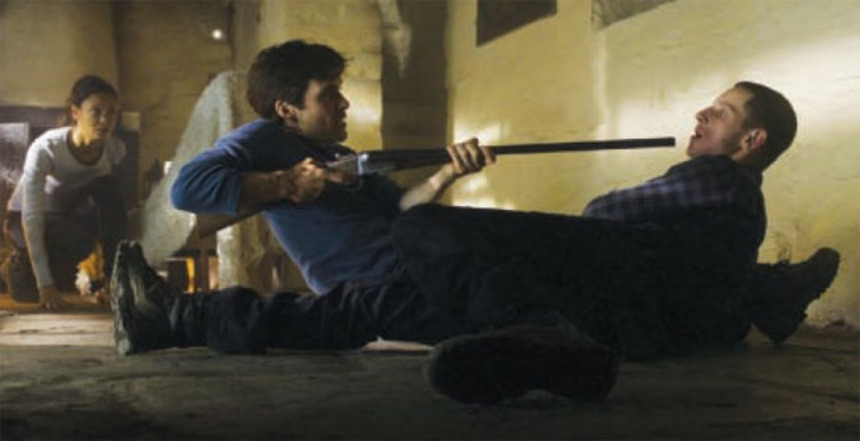Fantasia 2011: RETREAT Review (Another Take)

As the story goes, Alfred Hitchcock had an expression about logic and plot coherence in a film which he called the 'ice-box moment.' Namely when an audience member goes home that night after watching a film, and while getting a bit of leftover chicken out of the refrigerator as a midnight snack stops cold in his tracks and thinks, "wait a minute, what that character did or where that character was doesn't make sense!" The commercial bonus of inserting an ice-box moment or two in the film was that the revelation would compel the audience member to go back to the cinema and watch the film a second time to see if the events made sense or if there was a drastic logical flaw in the film.
Mark (Murphy) and Kate (Newton), dealing with the pain the one-two punch of an unplanned pregnancy and subsequent miscarriage, aim to find solid ground for the relationship by heading out to an island cottage which for them marks a happier time. On the new trip, the weather is grim, the water is as icy as is their demeanor towards one another and nothing in the cottage, particularly the pesky generator, seems to work. That happier time doesn't act as a balm, but rather it inflames the crack in the relationship. The isolation on the island becomes far worse when the CB radio connection to the mainland stops working and a stranger in combat fatigues, covered in blood and possessing a handgun passes out at the door of the cabin. Jamie Bell, an actor who has to the best of my knowledge never given a bad performance and his great here, playing the the character opposite to Billy Zane's smooth psycho. Jack is slightly off his rocker, seems to never clean the dried rivulets of blood of his brow and exudes a cloud of paranoia as he takes the couple hostage raving about a plague that has wiped out all of Britain. Mark and Kate probe him for details, but are highly suspicious of his motives because he will not calm down in an effort to immediately barricade the cottage.
So far so good: Characters established, situation ambiguous, tension palpable. But in an effort to subvert the genre (or diverge from Dead Calm) and do something innovative in the plotting department, Retreat goes far afield of making any kind of darn sense. It sets up elements and doesn't pay them off, it has Mark and Kate make boneheaded decisions that keep the film holed up in the cottage and the psychological games afoot, but neuter the fantastic island location. And this after the opening act has Mark jogging around the island making an attempt to establish geography and options available later to mix things up a little. I am all for the chamber drama, when handled in something like The Disappearance of Alice Creed or Death and The Maiden, it can be a wonderful thing. But why show us the Island in the opening act and then cloister the characters in the tiny cottage? Here, with Mark's masculinity castigated at every turn (the director not only makes him bad with tools, but also asthmatic), and Kate a shrill blank slate more interested in antagonizing Jack than solving anything. It tests the audience's sympathy in the worst kind of way. Having characters that either start out competent to attempt to deal with the situation or grow into some level of competence is necessary, I believe, for a straight up thrillers to work. If someone is going to tweak the genre rules, and I'll grant that genre exists especially to break or manipulate its rules and framework, they have to do it better than it is done here. A colleague of mine often says that we do not have to like the characters in these films (albeit it helps), but if we do not like them, we can at least respect them for being good at something. I am all for subversion of genre tropes, and The Retreat is aiming for this, but having a winner idea and executing that idea successfully are two different things. Frankly, The Retreat neither deserves or earns its denoument.
A final act re-arrangement of the crisis at hand comes too fast, too sloppy and offers little in the way of catharsis. And in light of the ending of the film, very little that has came before makes a lick of narrative sense. Logic in thrillers should not be the enemy, no matter how good everything else is in the film, this is going to be a real dealbreaker for many. It certainly was for me. No amount of ice-box moments, and there are at least two or there here, are going to compel me to return to the theater for Retreat.

Do you feel this content is inappropriate or infringes upon your rights? Click here to report it, or see our DMCA policy.






